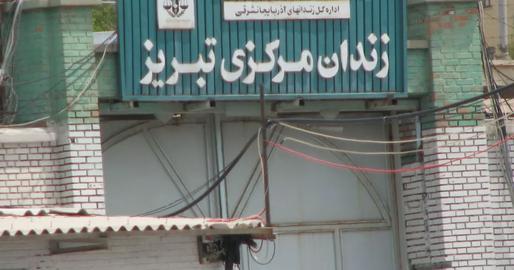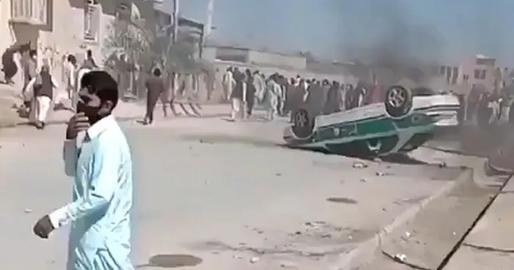It has been more than 40 days since Mahsa Amini died in police custody, triggering nationwide unrest that led to a brutal crackdown by security forces. According to the latest figures released by Human Rights Activists News Agency (HRANA), more than 13,000 protesters and their supporters have been arrested. Their names have not been officially announced, and the whereabouts of many of them remain unknown. But others were able to give horrific accounts of what happened during interrogations.
One of these detained protesters spoke to IranWire about the physical and psychological violence he encountered while in detention.
Tabriz Intelligence Bureau, Room 37
Mr. N. was arrested in Tabriz, capital of East Azerbaijan province. A picture of him was taken during a protest and shared on social media by supporters of the regime. That’s why he could be quickly identified by the security services. “Less than two hours after my picture was posted I was called from an unidentified phone number. I had returned from Tabriz to the city where I work. Until noon I was called from unidentified numbers twice again, but I didn’t answer. The same afternoon I was called from a mobile phone and I answered. The caller told me I had to go to the Tabriz Intelligence Bureau, room 37.”
Mr. N. did not go to the intelligence office. And on October 9, two agents of the Tehran Police Criminal Investigation Department and four agents of the Intelligence Organization of the Islamic Revolutionary Guards Corps (IRGC-IO) came to his home: “The police investigators treated me with respect, but they soon left to do their work. IRGC-IO agents took me to Tabriz in a car with smoke-colored windows. On the way they asked me where my mobile phone was, and I said I didn’t have any.”
Close to Tabriz, the agents placed a small, white bag over Mr. N.’s head: “I think we stopped outside the city because I could hear dogs howling far away and the sound of cars driving on the expressway. Then I heard something that sounded like a gate being opened.”
After getting out of the car, the group climbed a few steps and crossed a doorway. At that moment Mr. N. started hearing voices: “I could hear moaning and shouting. We went through a third door, and they told me to keep my head down, pulled off the bag from my head and ordered me to remove my clothes.”
IRGC Intelligence’s Detention Center, Cell 19B
Mr. N. describes the start of his sufferings in detention: “Somebody imitated the sound of a stun gun and shouted ‘faster.’ I took off my clothes. Four people were surrounding me. One of them had his hand on my head. They ordered me to sit down and to stand up and used flashlight on me. Then they gave me a uniform of the Guards’ detention center and took me to solitary confinement.”
The cell measured three meters square with a toilet behind a partition. Mr. N.’s cellmate was a young man: “Amir was arrested in Saqqez [in Kurdistan]. They brought him to the cell on the first day of the protests and hadn’t visited him since then. He was getting crazy and could not sleep. He said he was ready to confess to murdering his parent in order to put an end to his nightmare. They brought one dish of food for both of us.”
First Interrogation -- Psychologic Torture, Beatings, Forced Confession
Shortly after, Mr. N. was taken for interrogation. They tied his hands and covered his head with a black cloth: “Once again we walked around and around before climbing a few steps. As we entered the main building, I heard a few people screaming. Somebody asked: ‘Is this the same guy we called but didn’t come?’ Then they kicked me behind my knees.”
Mr. N. fell to the ground, and somebody pulled him up: “Then they kneed me in my ribs. When I fell to the ground, somebody said: ‘This one is because last night in the cell you gave advices to that little dog.’” Mr. N. had advised his young cellmate to “deny everything.”
The interrogators left him on the floor and got out: “I don’t know whether I was conscious or unconscious, asleep or awake, but I didn’t move. When they came back somebody else was accompanying them. Then they removed the cloth from my head.”
They brought a young man into the room to torture him and force him to confess, while at the same time trying to break Mr. N.’s resistance: “There were three decrepit wooden tables in this room that measured six meters by three meters. Two tables were facing each other, and a rod was placed on the third one. Clearly it was used to spreadeagle detainees. They had done it so many times that the tables were sagging.”
The young man was shouting: “’I was arrested on September 23. The one you are talking about died on September 29. Why don’t you understand?’ And the interrogator said: ‘You have been saying this for 10 days. Write down who was the owner of the firearms that were found in the house and I will fix the dates.’ Then the young man shouted that the weapons didn’t belong to him. This exchange was repeated again and again.”
Mr. N. later found out that the detainee was nearly 30 years old and was a native of Urmia, the capital of West Azerbaijan. As the interrogation continued, one the interrogators turned his attention to Mr. N.: “He grabbed my hair and pulled me up, and put me in a position where I could see the young man who was tied to the rod and the tables. It took him a very short time to confess. He said that if they untied him, he would write down whatever they wanted. Within seconds a thin man wearing a suit came in, recorded the young man’s confession and left.”
Then it was Mr. N.’s turn: “They took the young man away and started questioning me. The questioning lasted four hours but no violence was used. Then they took me back to my cell and the interrogator told me ‘See you in 40 days.’”
Sleep Deprivation, Second Interrogation, Shoulders Dislocated
Mr. N. was brought back to Cell 19B. Throughout the night, they kicked the cell door to prevent him from falling asleep. The next morning, they took him to the interrogation room again: “They focused on my mobile phone. I did not have my phone with me when I was arrested. I had told them that I did not have one. They asked questions about five SIM cards that were registered under my name. They said I had been using one of the SIM cards until a week ago, and told me the model of my phone. I said I had sold my phone and lost the SIM card.”
During this interrogation, Mr. N.’s hands were tied behind the chair: “One of the interrogators lifted my hands up and pulled. Two chair legs were off the floor. Then he punched my ribs, hitting the same place as the day before. No matter how much I screamed -- ‘I am sick; I have kidney pains; I am on medication’ -- it didn’t help.”
Both shoulders of Mr. N. were dislocated after the interrogator pulled his hands that were tied behind the chair: “The pain was so acute that I thought my spine was broken. They threatened me they would tie me to the rod and leave me in that position for a long time. They said nobody knew I had been arrested. I repeated that I had no mobile phone. Then an agent came in with a laptop. He tried to access my social media accounts through text messages.”
The agent said he had found something he could use against Mr. N.: “I only had stored on Telegram the phone number of a Telegram channel admin. This was enough for them, and the interrogator told me: ‘Now there is a perfect charge against you: relations with hostile media outside the country.’”
Inmates Raped In Overcrowded Tabriz Central Prison
On the same day, at noon, Mr. N. was transferred to the Tabriz Central Prison, where a large number of detainees were being held, most of them university students: “The prison’s quarantine ward was filled to the brim. I lost consciousness while I was talking to the prisoners. I don’t know how long it took me to regain consciousness at the prison’s clinic. The doctor did not have forms or stamps because prison officials had taken them away to prevent the transfer of detainees to an outside hospital. One of the prisoners fixed my shoulders but the pain was still killing me.”
Mr. N. says that what he witnessed during his three-day stay in the prison shook him to his bones: “I saw with my own eyes violent criminals raping very young detainees. Some of these criminals were promised to be released or granted a leave of absence if they harass detained protesters in any way.”
Last Interrogation, Freed On Bail, Awaiting Trial
Mr. N. was then taken to the Revolutionary Guards’ detention center. His third interrogation took place in the presence of several other detainees. None of them were from Tabriz but had been arrested in some other town: “One of the detainees was charged with being a separatist. He was a young man and the interrogators vexed him by saying sexual things about his fiancee and her gorgeous body. The young man was screaming: ‘Kill me!’ Another detainee, a very young one, was threatened he would be transferred to the common ward and raped. They used very obscene language. The interrogator told another detainee: ‘I will hit your fingers with a baton so hard that you will lose the ability to write.’”
The interrogators were focused on terrifying the detainees. One of them said: “Sixty-four people have been in solitary confinement here for two years. They were all like you and their names have not been published in the media.”
“I was feeling very bad because I didn’t take my medication,” says Mr. N. “I lost consciousness and after a few hours I was taken to hospital. When I returned to the prison ward, I heard some of the detainees would be transferred to Evin Prison [in Tehran], but the same day the fire and shooting took place at Evin Prison. The next day they started to release many detainees on bail. I was one of them and now I’m awaiting trial. I try not to go anywhere or talk to anybody because I start crying when I recall what I have seen [while in custody].”
visit the accountability section
In this section of Iran Wire, you can contact the officials and launch your campaign for various problems

























comments